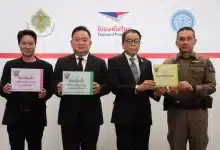The role of Thai NGOs in enhancing educational opportunities

Imagine a society in which each child, no matter their circumstances, is granted a quality education. This might sound idealistic, but in Thailand, it is being brought to fruition, all thanks to the relentless commitment of various non-governmental organisations (NGOs). These bodies are crucial in closing the education divide and presenting opportunities to pupils who might otherwise be overlooked.
A typical example is the EDF Scholarship program, which has received noteworthy support from donations, including a magnanimous contribution totalling 11,600,000 Baht. Piyanas Electric Showroom, among other enterprises, is also rising to the occasion, soliciting donations from clients across their seven outlets to beef up the scholarship fund.
Beyond merely financing education, these NGOs are deeply involved in shaping it. They assume roles such as training project supervisors, and refurbishing schools. It is worth asking, what does their involvement entails, and how it is revolutionising Thailand’s education landscape. Let’s take a closer look at how Thai NGOs are boosting educational opportunities.
Current efforts by Thai NGOs in education
Thai NGOs are actively making commendable strides in the education sector. From addressing educational inequality to forging proactive partnerships and designing innovative programs,.
Addressing educational inequality
One imperative area receiving concerted attention is unequal access to educational opportunities. Some NGOs, such as EDF and the Thai Health Promotion Foundation, provide mechanisms for broadening access. EDF’s Scholarship program, notably backed by donations amounting to 11600000 Baht, has been a game-changer in minimising the observed educational gap.
Partnerships with government and local communities
A cornerstone of progress in Thailand’s education sector hinges on partnerships between NGOs, governments, and local communities. The Baan Dek Foundation’s partnership with construction companies illustrates this collaboration, ensuring migrant workers’ children receive vital education. This holistic approach transcends merely provisioning resources to actively understand and cater to the community’s unique educational needs.
Programs and initiatives
NGOs in Thailand aren’t just limited to scholarships or partnerships. They’re pioneering innovative programs aimed at not just funding but also shaping education. A prime example is the ‘Power Kid Plus Project Supervisors Training’. After a successful first orientation, the second leg of this training emphasised project development, monitoring, and report writing.
Additionally, business entities like Piyanas Electric Showroom support education via public donations. Having received an impressive 2098150 Baht from generous customers, it channels these funds into scholarships, significantly strengthening educational opportunities in the process.
Not stopping at monetary aid, NGOs are also involved in tangible infrastructure development. Initiatives by organisations delivering school refurbishment activities take a hands-on approach to enhance the learning environment.
Impact of NGO activities on education quality

Improving accessibility for marginalised groups
Thai NGOs make a significant impact on improving accessibility to education for marginalised groups. For instance, a joint venture between EDF and other organisations raised a scholarship fund of 1,160,000 Baht in September 2011. It played a pivotal role in extending educational opportunities to students from economically disadvantaged backgrounds. Similarly, the Shinnyoen Thailand Foundation’s support for EDF projects provided a scholarship worth 185,000 Baht. It helped students partake in valuable, quality education, shaping their futures for the better.
Continuing the great work, entities like the Crown Property Bureau contribute to the EDF’s ‘Under the same sky’ project by providing scholarships worth 50,000 Baht. This project especially targeted support to orphaned students in three violence-affected southernmost provinces of Thailand. Thus, Thai NGOs, in collaboration with social institutions, put concerted efforts into ensuring that education isn’t a privilege enjoyed only by the few but the right of every child, irrespective of their socioeconomic background.
Enhancing educational content and teaching methods
Thai NGOs also play a decisive role in enhancing educational content and teaching methodologies. Notably, EDF, joined by the Thai Health Promotion Foundation, organised the second ‘Power Kid Plus Project Supervisors Training’. It comprised valuable lessons about project development concepts, project monitoring, and report writing. Project supervisors across different institutions benefited from this training. It ensured updated pedagogy and introduced innovative teaching methodologies.
While focusing on extending the reach of education, Thai NGOs simultaneously strive to improve its quality. Their efforts are rooted in the firm belief that everyone deserves a comprehensive, high-quality education, which can significantly uplift their lives.
Challenges faced by NGOs in Thailand
Funding and resource limitation
Maintaining stable funding and resources poses a serious problem for NGOs in Thailand, particularly those committed to uplifting education. While some can secure funds to support their scholarship programs, numerous others face significant financial constraints that can impact their ability to serve underprivileged students. For example, Piyanas Electric Showroom managed to gather donations amounting to 2,098,150 Baht across seven branches to support a scholarship. However, not every NGO can be as fortunate, translating into fewer educational opportunities for disadvantaged students.
Regulatory and policy barriers
Apart from funding limitations, confronting policy and regulatory challenges remains another hurdle that NGOs have to overcome. Educational NGOs must navigate complex regulatory landscapes, meeting stringent guidelines to uphold their commitments to their beneficiaries. Despite the donations received by organisations like the Education for Development Foundation (EDF), bureaucratic processes can derail swift implementation of programs, consequently hindering the progress of NGOs in enhancing educational opportunities in Thailand.
Future directions for NGOs in education

Strategic goals for sustainable development
Highlighting the role of NGOs in Thailand’s educational landscape warrants an examination of their strategic goals for sustainable development. NGOs play a critical role in bridging the educational gap and have a significant impact on sustaining progress. Their strategic aims often encompass the development of robust systems, capable of supporting educational continuity, even in the face of adversities.
For example, the EDF foundation, lauded for its emissions of a “5 Star rating” from the Giving Back Association for Good Governance, Transparency, and Financial Efficiency, exemplifies these goals. The foundation’s aspirations aren’t just for the present; they’re also about fortifying the future. By focusing on avenues such as scholarship programmes and school refurbishments, they continue investing in sustainable educational models.
In light of this, organisations are encouraged to devote resources not just to immediate issues but also towards developing long-term, sustainable strategies. The primary focus remains on the creation of opportunities and driving inclusivity in education, paving the way for Thailand’s future leaders, thinkers, and innovators.
Fostering community engagement and support
Community engagement remains pivotal in the grand plan of NGOs operating in the educational spectrum of Thailand. Establishing cordial relationships with all stakeholders in the community, including educational institutions, local businesses, families, and students, amplifies the impact of the initiatives undertaken.
The notion that education isn’t just the government’s or NGOs’ responsibility—it’s the entire community’s. The more individuals and businesses feel entwined in the efforts to amplify educational opportunities, the more feasible the implementation of sustainable educational models becomes.
By fostering community engagement and focusing on strategic goals for the long term, NGOs in Thailand can accelerate the pace of educational development, amplify inclusivity, and ultimately, transform countless lives.
You can also check out the high-level policy forum that endorses multilingual education advancement. The conference was a joint initiative by several prestigious institutions, including UNESCO Bangkok and Mahidol University. It assembled experts from across the Asia-Pacific region, with a major accomplishment being the endorsement of the Bangkok Priorities for Action on First Language-based Multilingual Education by education ministers from 20 Asia-Pacific countries.
Latest Thailand News
Follow The Thaiger on Google News:


























